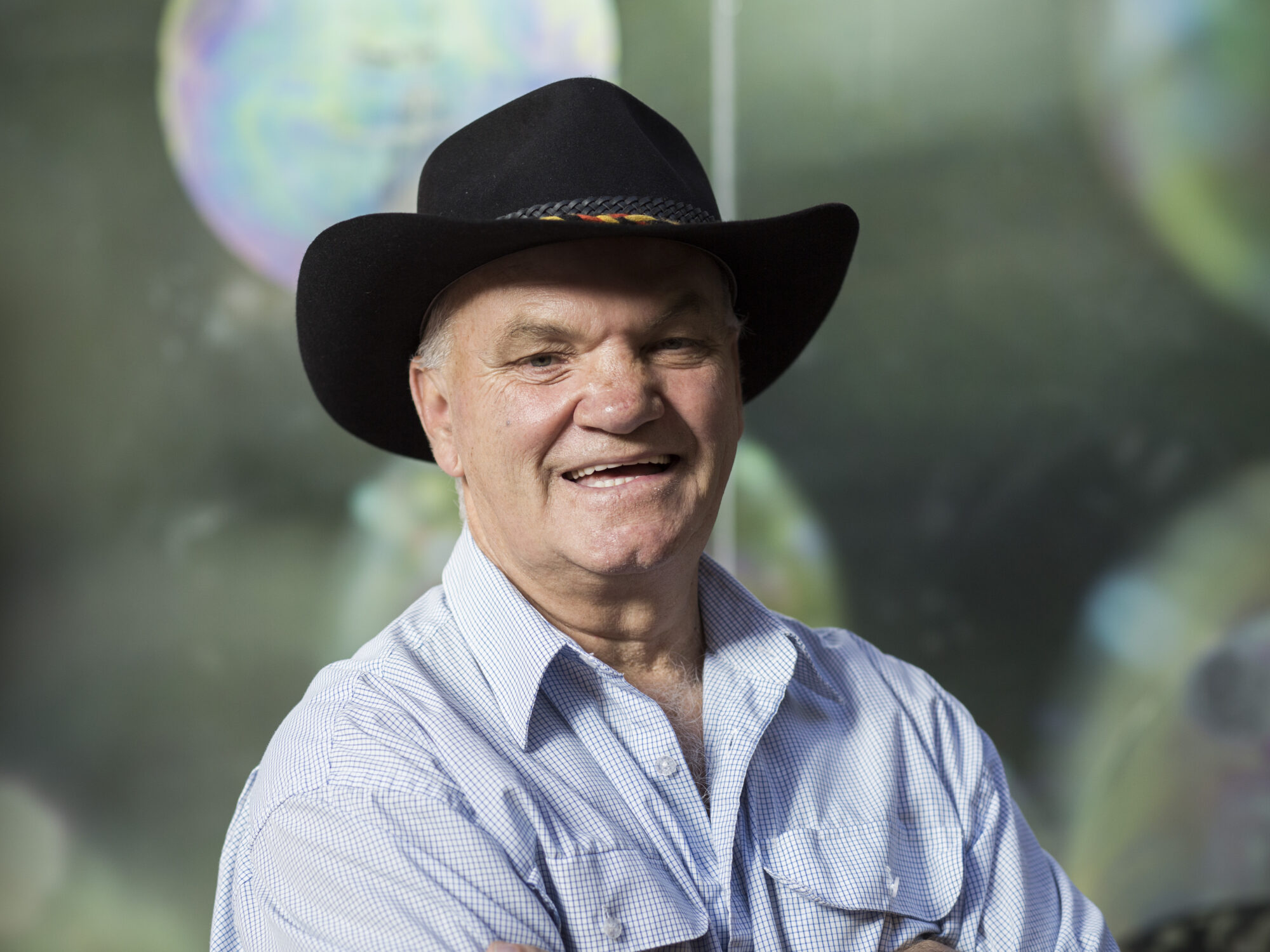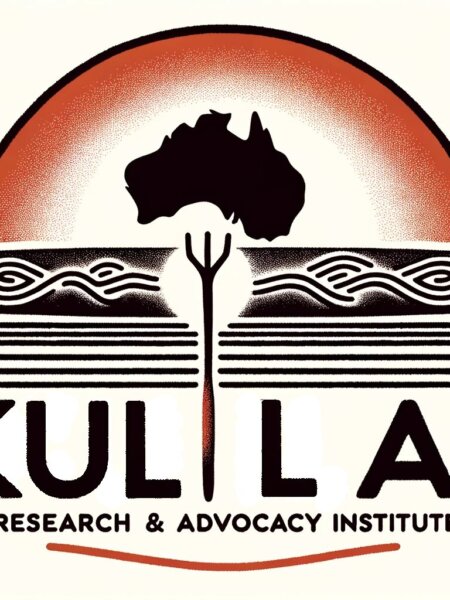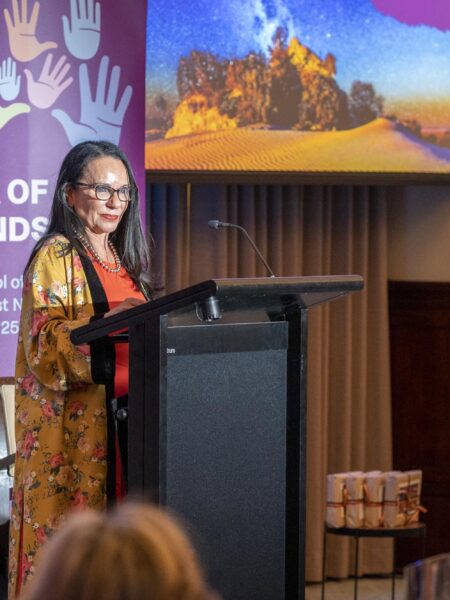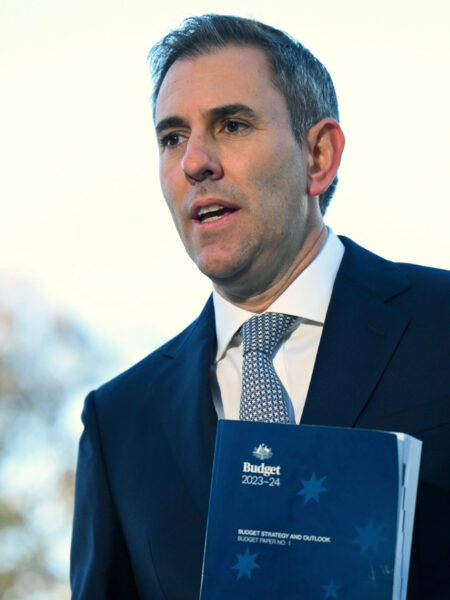I think this is a topic that needs a lot of discussion, needs a lot of exploring. And I suppose my view is not to head down the road so quickly. I, as much as many others in this country, am very aware that we need to move on and we need to try and settle the dispute. But I’m particularly concerned with getting it right.
I feel very humble that I’ve spent some 24 years celebrating NAIDOC Week in Cadigal and Eora country and I feel very humble every time I speak on their land. I left my land Ngembaa country (Ngembaa country is in the Brewarrina district in north-western NSW), some 27 or 28 years ago now, as a political refugee. And I left there because I was in doubt – and am still in no doubt – that had I stayed in that country, I wouldn’t have been here today, such was racial relations and police violence in that community.
There’s a lot of questions about a treaty, and one of the reasons that I don’t jump in and support treaty negotiations commencing, is that there’s not one treaty on the planet that people can hold up – given the few years’ duration that they can claim to have worked or, indeed, been honoured by those signing the treaty. With the Maori or the Native North American Indian people – and many of those people I’ve spoken to over the years – every time you talk of a treaty, they almost shudder. I was only talking to a Maori woman the other day up on the farm and we talked about a treaty and my position on that. And currently her community is negotiating a buy-back of the treaty by the New Zealand Government, and I would hate to think that we would be down that line in 50 years time. I won’t be. I’ll be fertilising a gumtree somewhere for sure. But at the end of the day, that’s my fear.
I don’t particularly concern myself with how long the discussion needs to happen. But what I do concern myself with is this: my forebears fought and died for their sovereign rights to be recognised in this country. If at some point in time, as part of treaty negotiations, a negotiated treaty comes about, I want to be quite conscious about the fact that I am signing away what they fought for. I want to be able to go and sit down somewhere and cry about that. I want to be able to go and sit somewhere, if necessary, and bleed for that, and bleed for the work that they’ve done before me.
Something that I concern myself with is my children and grandchildren. What right have I, as an individual, got to be signing away their sovereignty or their rights? People can talk about a document that might be dynamic and can be changed in the future to cater for the changing scene of things, or the changing needs and aspirations of Indigenous peoples. But if 100 years ago in this country women had signed an agreement with men, I would hardly like to think where you would be today in terms of equity and so on. And it’s those sorts of analogies that we can draw on.
The other thing that alarms me is the fact that non-Indigenous Australians very quickly jump on to the war cry of a treaty. I think, personally, that once again places Indigenous people in this country into a third or fourth world situation, as I call it, where the agenda is not really ours. I’s those of non-Indigenous Australians deciding for yus, that they will promote that path of going down the treaty line. My view is that I’m not convinced it’s as simple as that.
But non-Indigenous Australians, if they truly support the Indigenous movement and the Indigenous struggle in this country, may find themselves supporting a whole range of different positions. The position the Ngembaa take on the treaty may be different than the Wiradjuri or the Pitjantjara or the Walpiri. The positions may be very different. Some Indigenous communities and nations will want to go down the treaty road, and they have that right. That’s what we fought for, for the last 214 years, that right to self-determination. But that right to self-determination for one community can’t take away the right for self- determination of another.
And we can talk about technically about how we might go into negotiating treaties, and what shape it might take, and what might be in it – and there’s a plethora of things that will be in a treaty. And the problem with itemising what might go in it – and I won’t even begin to do that – is the fact that you may forget something before you sign it, and it may become apparent later. If thirty years ago we were signing this treaty, we might not have talked about information technology, for example, as being part of how Indigenous communities may be resourced under that treaty.
We live in a country that is very reluctant to change. You only need to look at history of referenda in this country being voted down. So even if a document is ever produced, what guarantees that it will change? We may come back to the table and renegotiate things because it fits with the times and it fits with the technology and the social attitudes of the day. But there’s absolutely no guarantee that those negotiations will be fruitful or come down on the side of Indigenous people.
And I’ll come back again to the point again of this fourth worldness. I would personally ask non-Indigenous Australians particularly not to jump on the bandwagon of a treaty. But if you do, and if you must, then jump on it as nation states. Don’t jump on it on behalf of me and my families, and don’t jump on it yet on behalf of the Ngembaa, because we haven’t discussed this as a community properly. And until we make that decision – which road we want to go – then we’ll come and call for your support.
I agree with probably every Aboriginal person in this country: there needs to be some agreement. There needs to be some process. There needs to be an improvement in the lives of Aboriginal people around this country. We know that. There needs to be an enormous amount of social and economic development in our Aboriginal communities. We know that. We just don’t know what the vehicle might be to achieve that. And let’s not jump into something that has a history of not working worldwide.
The reality is for me that I probably won’t be here if a treaty does get negotiated. The reality is for treaties that they’re at least thirty to forty to fifty years in the process of reaching agreement. Many of us here won’t be around to benefit from it, or whatever. But that doesn’t matter. What does matter is our contribution to it; and what I do agree with is getting it right. And it has to be gotten right, because I don’t think we’re going to have a whole lot of opportunities in the future to come back to it and try and get it right if we make mistakes in it. And I don’t care how long that takes. I don’t care if it takes another two hundred years. We’re already two hundred and thirteen or fourteen years down the track. If it takes another two hundred, then let it take that time.
I don’t feel I’m at war with people any more. I feel that we’re working towards a solution. But we’ll get to a point – you can bet your life – where somebody will want to put a timeline on this of five years or ten years or fifteen years. And the minute that you restrict anything by time, you are limiting what can be achieved. The amount of time applied to getting it right – whatever format that may take – it’s critically important that we allow the time it takes.
Therefore I suppose I’m submitting to you that, at this point, I certainly don’t agree with the treaty. I agree with the discussion continuing. I agree with people’s right to support whatever they support, whether it be a treaty or some other form of an agreement. But I support my right to disagree with going down that line at this particular point in time.
And regardless of who throws up the ideas, it doesn’t matter. We can’t point to an elected arm in Australia – and this is no attack on those elected representatives that have been elected by sections of our community. But the reality is that nobody can totally claim to be an elected representative of us, whether it be at council or ATSIC or wherever. The reality is that most Aboriginal people that are eligible to vote still don’t in either of those elections. So nobody can claim that mandate, that they’re speaking as an elected representative of the Aboriginal community. Because there’s no such thing as the Aboriginal community. There are Ngembaa communities. There are Wiradjuri communities. We are living in a country that is almost – and I suppose if I can just draw this analogy as my final statement – that we’re living in a country that is like a black Europe. And it really is about time that Indigenous people and non-Indigenous people in this country acknowledged the fact that we’re not one homogenous group. We are different. We come from different nations, with different laws. We’ve been affected differently by colonisation and so on in this country. The effects of that, the nature of it has been vastly different, and we need to be treated differently. And I think if we go down the line of a treaty, that’s where the lines will be drawn and nation states will stand up and identify themselves.
Read the complete Treaty Talks given at the ESORA and NAIDOC Week Forums Treaty! Let’s Get It Right!




